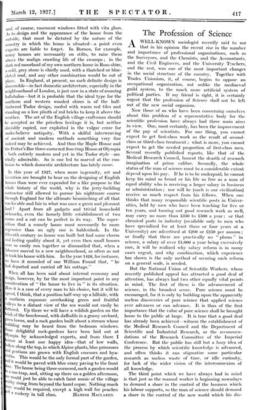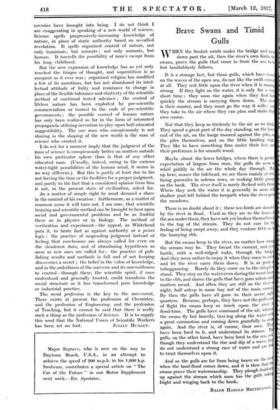The Profession of Science
WELL-KNOWN sociologist recently said to inc that in his opinion the recent rise in the number and importance of professional organizations, such as the Surveyors, and the Chemists, and the Accountants, and the Civil Engineers, and the . University Teachers, and the rest, was one of the most important changes in the social structure of the country. Together with Trades Unionism, it, of course, begins to oppose an occupational organization, not unlike the mediaeval guild system, to the much more artificial system of political parties. If my friend is right, it is certainly urgent that the profession of Science shall not be left out of the new social organism. .
Now those of us who have been concerning ourselves about this problem of a representative body for the scientific profession have always had three main aims in view. One, most certainly, has been the improvement of the pay of scientists. For one thing, you cannot expect to get first-class work as the result of second- class or third-class treatment ; what is more, you cannot expect to get the needed proportion of first-class men. Several recently .published reports, like that of the Medical Research. Council, lament the dearth of research imagination of prime calibre. Secondly, the whole status of the man of science must to a considerable extent depend upon his pay.. If he is to be underpaid, Ile cannot keep his mind so broad or his life so free as a man of equal ability who is receiving a larger salary in business or administration ; nor will he (such is our civilization) receive so much respect from his fellows. When one thinks that many- responsible scientific posts in .Univer- sities, held by men who have been teaching for five or ten years, and turning out good research work as well, may carry no more than 1350 to £500 a year ; or that chemical posts in industry (available only to men who have specialized for at least three or four years at a University) are advertised at 1200 or £250 per annum ; or finally that there are practically no " plums" us science, a salary of over £1,000 a year being excessively rare, it will be realized why salary reform is in many cases urgent, and why combination, which experience . has shown is the only method of securing such reform on a general scale, is needed.
But the National Union of Scientific Workers, whose recently published appeal has attracted a good deal of attention, has always had two other equally vital points in mind. The first of these is the advancement of science, in the broadest sense. Pure science must be encouraged, for it is only by building upon the apparently useless discoveries of pure science that applied science ever advances or can advance. It is thus of the first importance that the value of pure science shall be brought home to the public at large. It is true that a good deal has already been achieved— witness the establishment of the Medical Research Council and the Department of Scientific and Industrial Research, or the recommen- dations of the Research Committee of the Imperial Conference. But the public has still but a hazy idea of the process by which scientific knowledge is advanced, and often thinks it can stigmatize some particular research as useless waste of time, or idle curiosity, for lack of the wider vision of the interconnexion of all knowledge.
The third point which we have always had in mind is that just as the manual worker is beginning nowadays to demand a share in the control of the business which his labour supports, so the man of science should demand a share in the control of the new world which his dis- coveries have brought into being. I do not think I am exaggerating in speaking of a new world of science. Science spells progressively-increasing knowledge of nature, in place of static authority based on so-called revelation. It spells organized control of nature, not only inanimate, but animate ; not only animate, but human. It foretells the possibility of man's escape from his long childhood.
But the new expansion of knowledge has as yet only touched the fringes of thought, and superstition is as rampant as it ever was ; organized religion has modified a few of its assertions, but has not abandoned its intel- lectual attitude of fixity and resistance to change in place of the flexible tolerance and elasticity of the scientific method of continual tested advance ; the control of lifeless nature has been exploited by pre-scientific commercialism or turned to the ends of pre-scientific governments ; the possible control of human nature has only been realized so far in the form of interested propaganda utilizing invention to play upon half-educated suggestibility. The one man who conspicuously is not sharing in the shaping of the new world is the man of science who created it.
I. do not for a moment imply that the judgment of the man of science is conspicuously better on matters outside his own particular sphere than is that of any other educated man. (Usually, indeed, owing to the curious water-tight possibilities of the human mind, it seems in no way different.) But this is partly at least due to his not having the time or the facilities for a proper judgment, and partly to the fact that a considered opinion from him is not, in the present state of civilization, asked for.
As a matter of simple right he must demand a share in the control of his creation : furthermore, as a matter of common sense it will turn out, I am sure, that scientific training and scientific method can be brought to bear upon social and governmental problems and be as fruitful there as in physics or in biology. The method of verification and experiment—the appeal, as Whitehead puts it, to brute fact as against authority or a priori logic ; the practice of suspending judgment instead of feeling that conclusions are always called for even on the slenderest data, and of abandoning hypotheses as soon as new ones are called for ; the practice of pub- lishing results and methods in full and of not keeping discoveries a secret ; the belief in the value of knowledge, and in the orderliness of the universe and its amenableness to control—thiough these, the scientific spirit, if once understood and generally trusted, could transform the social structure as it has transformed pure knowledge or industrial practice.
The word profession is the key to the movement. There exists at present the profession of Chemistry, and the profession of Engineering, and the profession of Teaching, but it cannot be said that there is really such a thing as the profession of Science. It is to supply this need that the National Union of Scientific Workers































































 Previous page
Previous page